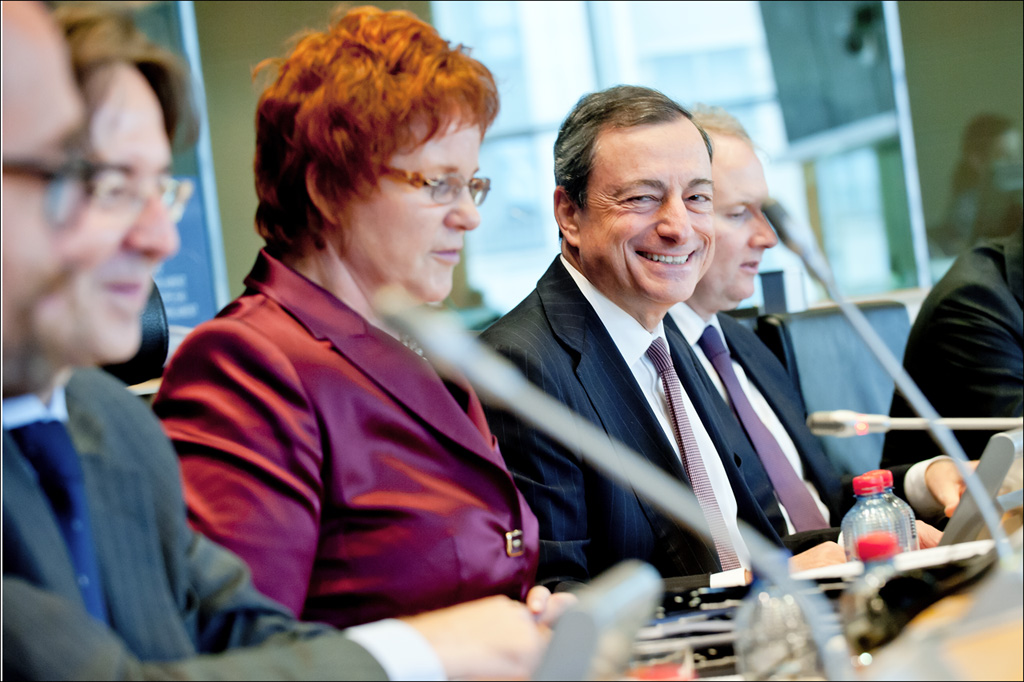What will European elections mean for financial regulation?
You’ve all heard the story of the global financial crisis, the banks that failed, the bets that lost, and the governments that just didn’t know what to do. You’ve probably also heard about the deluge of economic initiatives and financial regulation that poured forth from the public sector in the wake of the crisis to try to make sure that ‘it will never happen again.’
What you may or may not have heard about, is the group of people in Brussels who played a big part in driving that effort forward – or sometimes forcing it to take a sharp turn.
Sure, Europe’s Finance Ministers and the folks who show up at G20 meetings a couple times each year are the ones who normally call most of the shots, but since Europe’s Lisbon Treaty came into force in 2009, the European Parliament has played an increasingly decisive role in shaping the content of EU law. Though this is the case across sectors, the response to the crisis created an unprecedented situation where this trend has been most acutely felt in the field of financial regulation.
Who are these ‘faceless’ Parliamentarians then? Well, as our PA2.0 blogger, Stephan Thalen, from the other week pointed out, most of the Parliament’s substantive work takes place in Committees, with the Economic and Monetary Affairs (or ECON) Committee being the one we’re getting at here.
Why do these people matter?
Given the impact of the global financial crisis, MEPs on the ECON committee have carved themselves a crucial role in the implementation of the G20’s post-financial-crisis agenda. Drafting their own version of the Commission’s proposals and fighting it out with Member States in trench wars that sometimes have dragged on for months on end. Integrated European banking, markets, and insurance standard-setters? Higher contributions for banks to pay in case of their failure? Strict limits on the bonuses that banks can pay their employees? Yep, those were all things the ECON Committee clung to in negotiations and didn’t let go of until they got their way.
So the big question then is, how do we expect this vitally important committee to change with the European elections this month? It’s ultimately hard to say, as the composition of Committees is always the subject of a long and murky process of horse-trading before their creation (again, see Stephan’s blog). But based on the big trends we’ve been highlighting recently, and our understanding of each MEP’s prospects, we’ve come up with a number of outcomes we think we’re likley to see in ECON later this year:
- Center-Left / Centre-Right cooperation: Recent polls show that an EPP-Socialist grand coalition is likley to be the only workable majority in the next EP – and this will be reflected across committee structures – including ECON. While both are (for the most part) pragmatic, the two groups often do not see eye-to-eye, so the process of coming to common positions may become longer, and even more complex.
- Uncertain influence for smaller groups: The Liberals used to be the king-makers in ECON, but their future looks increasingly uncertain as poor election performance could diminish their ranks. Similarly, the UK Tories (who have been part of the somewhat-sidelined European Conservatives and Reformists – ECR – Group) in ECON may weather the 2014 poll well, but still face increasing uncertainty in the next Parliament . This means that the continued presence of traditionally market-friendly voices in ECON is at risk. The Greens, who have been the main drivers behind top files such as the reform of bank structure and remuneration limits, have developed a strong working relationship with the Socialists in this Parliament, and look to stand a better chance of maintaining the influence they’ve gained.
- Significant turnover: Several important ECON MEPs have decided to step down ahead of this month’s election. This includes ECON Chair Sharon Bowles, Vice-Chair Arlene McCarthy, the EPP coordinator Corien-Wortmann Kool, and EPP veteran Astrid Lulling. Many other crucial MEPs are further considered to be at risk of not being re-elected in the coming vote. While this may not affect overall Group numbers, it could strengthen the hand of more experienced members who remain, including German MEPs from Angela Merkel’s CDU/CSU (making them well placed to grab the Chairmanship of the Committee).
Also, a recent debate that we’re watching closely has been over whether or not the Parliament should have a specific committee to deal with Eurozone-only issues, such as oversight of the single currency, the Eurogroup, the European Stability Mechanism, and the newly formed Banking Union. While opposition to some form of ECON Eurozone Sub-Committee has softened recently, with German and French delegations warming to the idea, strong resistance is still expected from other influential groups such as the Polish delegation, who fear this could lead to a two-tier “ins” and “outs” decision-making model and entrench divergent interests between the two sides of the currency bloc.

So, how complicated can things get?
The ECON Committee stands to experience significant shifts in the next few months – but none more important than the numbers game of how the political groups count to a majority. While Grand-Coalition type configurations are easy to understand, their politics usually tend to be much less straightforward, relying on strategic trade-offs, accumulation of favors, and often obscure negotiations. While strong positions are often harder to come to, the benefit, from the Parliament’s perspective, is that the position (once reached) will normally benefit from unusually strong support among its members and ideally be harder to dislodge in negotiations with the Council.
If you’re interested in an even more in-depth look at what we here at FleishmanHillard think the ECON Committee will look like after the election, and the implications this could have for financial services policy in Europe going forward, you can read our “Changing Faces in ECON” briefing written by FH’s Financial Services Practice.
Find Out More
-
Are you fit for 2024? Communicating in a year of change
February 27, 2024



